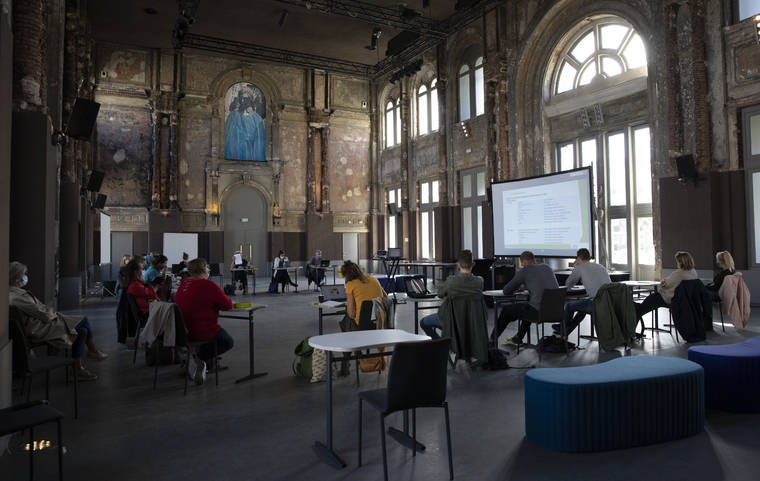BRUSSELS — In a world turned upside down by the coronavirus pandemic, rarely have so many kids relished the end of their summer vacations — and rarely have so many teachers faced such anxiety as school bells ring in a new year across much of Europe starting Tuesday.
The pandemic-stained months of this year’s summer break — with social distancing rules and enforced seclusion from friends — came on top of months of lockdowns and uneven online instruction since COVID-19 hit Europe.
Now from Belgium to Russia, France to Hungary, tens of millions of kids will be unleashed upon one another in classrooms, gyms and playgrounds again. While it’s a joyous time for youngsters, parents and teachers are more than uneasy how that will fuel the continent’s daily infection rates, which are already much higher now than in May or June due to virus spread during family outings and summer vacations.
“The first thing I will do at school will be greeting everyone and hugging, because I’m full of love,” said Eva Aldanova, 10, who is heading back to her 4th grade class in Moscow. “I will tell everyone that I missed them a lot. And I will get ready for my first lesson!”
Preparing schools for that first lesson has been a challenge throughout the continent, which in contrast to many school districts in the United States, is choosing in-class teaching as opposed to online. Disinfectants need to be in place, better air circulation guaranteed, masks plentiful, ways to reduce interactions between large groups of students introduced. Some language teachers will even need transparent face masks so they can show pupils how to pronounce words.
“I feel OK, but I am a bit tired because we worked on all those plans, security plans, and risks assessments the last two weeks, and it was a lot of work,” said Karin Heremans, director of the Atheneum Antwerp in the northern Belgian port city. “We have 600 students so we need to manage everything. But I am very hopeful.”
One of the main worries is whether students will be able to wear masks the entire school day. The World Health Organization says students 6 to 11 should wear masks in cases where they cannot social distance, and students 12 and over should wear masks just like adults.
“We are really wondering how it will go if we ask students of all ages to wear one or two masks all day long,” said Luc Pirson, President of FAPEO parents’ federation in Belgium. “No adults (teachers) for the moment had to wear masks for 8 hours straight. So we really hope that teachers, administrations will make space in the schedule to allow students to breathe normally.”
It all underscores what WHO’s Europe office on Monday called “the largest disruption of education systems in history.”
Nations across the continent, which has seen over 209,500 confirmed deaths in the pandemic, are already struggling to contain a renewed wave of infections and are desperate to keep school openings from worsening the situation. Authorities have put 20% of France’s regions in the red zone for community virus spread.
Cecile Cluchier, a nursery school teacher in Antony, a town south of Paris, knows kids will be very excited to see their friends at school and says social distancing won’t be the first thing on their minds.
“Let’s not fool ourselves. We know that with 25 pupils, we won’t always be able to keep an eye on each of them,” she said.
France’s education minister has admitted that not all schools across the country will be ready to open as planned on Tuesday and French doctors say the government’s virus-fighting measures for schools are too lax.
WHO says the extended school closures have affected children’s mental health and social development and those effects could linger for years. Good remote education relies on students having laptops, wireless connections and a dedicated place at home to learn — things that poor children often lack. Experts say coronavirus lockdowns have widened the educational gap that already exists between wealthy and poor students.
Many pupils will have a lot of catching up to do, teachers say.
“We’re not going to start this year as if the previous one had ended normally. We’re obviously going to have to go over lessons from last year and we will have to adapt the content of our lessons,” said Aline Becker, headteacher for over 400 children at the Anatole France school in Antony.
She urged patience, for students, parents and teachers.
“We’re not going to bridge this gap in three weeks or a month,” she said.
————
Sylvain Plazy and Virginia Mayo in Antwerp, Sasha Roslyakov in Moscow and Alex Turnbull in Antony, France, contributed.
———
Follow AP’s pandemic coverage at http://apnews.com/VirusOutbreak and https://apnews.com/UnderstandingtheOutbreak


